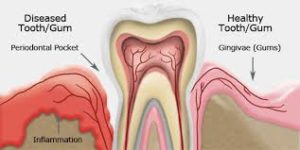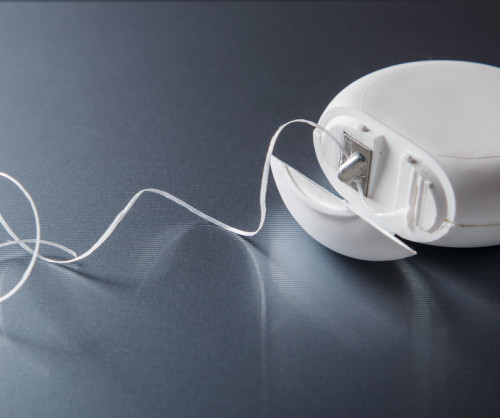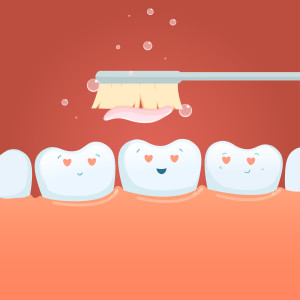Category Archives: Daily Dental Care
What is that SMELL? (YIKES, it’s my Face Mask Bad Breath!)

There it is. You’re walking through a store and it hits you – a bad smell. It hits you again throughout the store and you finally realize – it’s your breath. Face masks have made some of us realize that, surprise, we do indeed have bad breath. It’s an extremely common problem, with over 80 million people experiencing bad breath, according to the Academy of General Dentistry.
Although you may have not noticed it before, now your breath is smacking you right in the face every time you wear your mask. Making your bad breath all the more noticeable and frustrating.
Related Article: What’s Up With My Bad Mask Breath
Why You’re Experiencing Bad Breath
There could be a few different reasons you’re experiencing bad breath, and your dentist can help! Some of us may have been experiencing bad breath for a while but have gotten used to the smell and don’t notice it until we wear a mask.
Bad Breath Diagnosis and Treatment process from Mayo Clinic.
This could be due to:
- Bad oral hygiene. When you’re not brushing well or often enough, bacteria can build in the mouth and cause bad breath.
- You ate or drank something smelly. Coffee, onions, garlic, and foods high in sulfur can make a negative impact on your breath for up to 72 hours, even with brushing. Try combating the smell with lemon, fresh fruit and vegetables.
- Sweets. Sugary treats increase bacteria in your mouth tenfold and increase the stink-factor of your breath. Dentists suggest eating plain chocolate if you’re needing something sweet. Drink water after to remove any chocolate remnants.
- Medications. Many common medications can dry out your mouth and contribute to bad breath. Talk with your doctor if you think your medications may be causing dry mouth issues.
- Tobacco. Cottonmouth is a common side effect to smoking any tobacco products. Smoker’s breath is a real thing!
- Sinus infection or allergies. When your nose gets stuffed up, you’ll probably breath more often through your mouth. This can dry out your mouth and reduce odor-killing saliva.
Related Article: Bad Breath Could be More than a Stinky Situation
How To Treat Bad Breath
When the face mask bad breath sneaks up on you, it may be time to visit your dentist for a cleaning. In the meantime, brush your teeth twice a day and try brushing your tongue to get rid of any extra bacteria lingering in the mouth. You can also try an anti-bacterial mouthwash, and floss to remove any food buildup in-between the teeth.
Related Article: Dental Exams are Important for SO Many Reasons
Learn more oral hygiene tips from WebMD HERE.
Dr. Gary P. Skrobanek’s experienced and friendly team at GPS Dental offers affordable dental care for all ages in San Antonio, TX area. Our Brooks City Base dentist office is conveniently located and offers early morning appointment times Monday through Friday to meet your needs. At GPS Dental, we promote dental health awareness to our patients and provide most dental services, from family and general dentistry to dental implants, sleep apnea, TMJ / TMD Treatment, cosmetic dentistry and much more. We accept most dental insurance plans and offer affordable financial solutions for any budget. Call us at 210-633-3477 to make an appointment.
Bad Teeth? You May Need Perio Treatment

Bad Teeth are more than an eyesore: You May Need Perio Treatment
Have you ever noticed a person with what you would consider “Bad teeth?” If so what’s the first thing that comes to mind? For many people this is considered as something of an aesthetic problem, and while stained or decayed teeth are obviously unattractive, did you know that they can be a tell tail sign of serious underlying health problems as well?
That’s right! In many ways your oral health can be both the key to maintaining your overall general health and conversely, if neglected can lead to serious problems that may impact your health in numerous ways. This of course includes not just your teeth, but your gums and surrounding areas, as all of which can be susceptible to this health concern known as Periodontal Disease.
Perio: Periodontal Disease
Periodontal Disease or sometimes known as Periodontitis, perio disease or gum disease. It is a progressive inflammatory disease that affects the teeth and surrounding tissue, and while this may sound relatively benign at first, don’t be fooled! Perio disease can in fact be a serious or even life-threatening condition that may result in a litany of additional health problems.
Although there are multiple factors that may contribute to the onset of periodontal disease, the primary cause is the buildup of excess bacteria in your mouth due to dental plaque. While early symptoms are seemingly minor nuisance such as swollen or bleeding gums, keep in mind that perio disease is a progressive infection and therefore will continue to get much worse if not treated. If further neglected, the infection will continue to spread throughout the mouth, thus damaging or ultimately destroying the teeth or jawbone.
While excess bacteria may be the primary culprit for the onset of perio disease, there are numerous risk factors that could contribute to the likelihood of developing periodontal disease as well.
These factors may include but are not limited to:
- Smoking or tobacco use
- Excess stress
- Clenching or grinding your teeth
- Misaligned teeth
- Hormonal imbalance
- Genetic disposition
It should also be noted that certain medications and poor dietary habits can also expedite the progression of periodontitis, as can other diseases or illnesses. This can prove to be a serious issue for those with other medical conditions (such as diabetes) as periodontitis may likely interact with or exacerbate such conditions, or even trigger additional illnesses.
The Domino Effect: What Perio Disease can lead to
While periodontal disease is certainly a nasty enemy in itself, what makes an enemy worse is an enemy with friends! As mentioned previously, the number of additional diseases or illnesses that can interact with or occur as a result of periodontal disease is staggering to say the least. As more research continues to be done on periodontal disease in recent years, numerous case studies continue to uncover links between periodontitis and other associated conditions.
Atherosclerosis: Atherosclerosis is a condition in which the arteries of the heart become clogged, thereby hindering its ability to pump blood thought out the body. Meanwhile due to the increase in bacteria growth, periodontal disease can create something of a chain reaction by causing the spread of plaque instability and inflammation. This of course would put further stress on the already weakened heart by continuing to thicken the artery wall, essentially choking the heart.
Heart Disease: Like atherosclerosis, periodontitis can also heavily contribute to the occurrence of heart disease. As gum disease continues to produce excess bacteria, bacteria may be released into the bloodstream. Once these toxins have reached the heart, they form fatty plaques within the arteries thereby causing blood clots. This obviously is a serious issue as blood clots can block and cut off the flow of blood completely, thus causing a heart attack.
Related Article: Show Your Teeth Some Love: Gum Disease and Your Heart
Diabetes Mellitus: Diabetes and gum disease have something of a combative relationship as both seem to directly affect one another, and therefore creating a compound issue. If left unchecked or poorly managed, diabetes will result in elevated levels of glucose or sugar to circulate throughout your body, including your mouth. With this heightened level of glucose, your mouth begins to build up an excessive amount of bacteria, thus creating the ideal setting for an infection like periodontal disease to develop. Conversely, like any serious infection, periodontitis can potentially affect the blood glucose level of those afflicted, thus making them increasingly difficult to control and ultimately cause the diabetes to exponentially progress.
Respiratory Disease/Pneumonia: As mentioned previously, if the buildup of bacteria caused by periodontal disease is able to spread throughout the body, the results could be devastating. This of course could certainly be the case if the bacteria from the mouth manages to infect the lungs, especially if the individual already has a preexisting lung condition. If the hazardous bacteria reaches the lungs the afflicted individual will likely develop a lung infection, however if the sufferer is elderly or has a preexisting condition this could result in a severe pneumonia, which could be potentially fatal.
Stroke: Individuals suffering from chronic infectious diseases are typically considered at an increased risk of suffering a stroke, and those with gum disease are certainly no exception. As explained earlier, the bacteria caused by periodontitis can wreak havoc on the heart by causing blood clots to block the arteries and reduce blood flow. If blood flow is reduced or restricted from flowing through certain sections of the body the results will certainly be serious. However, if blood flow is reduced or cut off from reaching the brain, the results are almost sure to be catastrophic. If the blood vessel delivering blood to the brain is blocked, this will often result in what’s called an Ischemic stroke, which may damage the brain cells and even result in death.
Avoid Perio Disease: Good health starts in the mouth!
As you can see, while having bad teeth and swollen gums may at first glance seem like little more than a cosmetic issue, the truth is that these unattractive features are only a small fraction of the major health crisis that is perio disease. So remember by practicing routine dental care and making those recommended six month dental appointments, you are not only taking the necessary steps in protecting the appearance of your teeth, but also in stopping a nightmare like periodontal disease dead in its tracks!
Dr. Gary P. Skrobanek and his experienced, friendly team at GPS Dental offer affordable family dentistry and gentle dental care in the San Antonio, TX area. Our office is conveniently located and offers early morning appointment times Monday through Friday to meet your needs. At GPS Dental, we provide most dental services, from family and general dentistry to dental implants, sleep apnea, TMJ / TMD Treatment, cosmetic dentistry and much more. We accept most dental insurance plans and offer affordable financial solutions for any budget. Call us at (210) 633-3477 to make an appointment.
Affordable Dental Care for Seniors at GPS Dental
Affordable Dental Care for Seniors: Untimely Problems
Entering your golden years can be a time of both relaxation and rejuvenation, and might in fact be some of the greatest years of your life! The term “golden years” refers to the time period between 65 to your eighties and beyond; when you are officially considered a senior citizen. It is during this time that many people choose to settle down and enjoy the fruits of their life’s achievements. However those precious moments spent with family, friends, or a significant other can be interrupted by an unfortunate situation that haunts many seniors, deteriorating teeth. Damaged or decayed teeth are not only unsightly and painful; they can also be costly and is the main reason that GPS Dental offers affordable dental care for seniors.
Affordable Dental Care for Seniors: Prevention is Key
It’s important to remember that when you age, your teeth age and change right along with you. Like anything, time can certainly take its toll and prevention is so important. As your teeth become older and increasingly worn, it is imperative that they receive some additional care. Offering affordable dental care for seniors is important to us because we want to keep our patients’ teeth strong and healthy and prevent some of their oral health concerns that many seniors are particularly susceptible to.
Some of these issues may include:
- root decay
- gum disease
- tooth loss
- oral cancer, particularly among smokers
Rooth Decay: Our older patients are at risk for root decay. What is root decay? Root decay is a cavity that forms on the roots of your teeth. Our senior patients are at a higher risk, because their roots are exposed due to receding, especially if they suffer from gum disease. Root decay can also be caused by brushing incorrectly or with a toothbrush that is too hard. Age-related gum changes can also be an impact.
Gum Disease: Did you know that half of Americans over the age of 55 have some form of gum disease? Gum disease is caused by bacteria in the tarter and plaque on your teeth. Teeth can become loose and eventually result in tooth loss. If your gums bleed when you brush your teeth or you have red or swollen gums, you need to visit Dr. Gary Skrobanek, DDS at GPS Dental, as these are signs of gum disease. Another sign to schedule your dental appointment is if you notice that your teeth are looking longer or if they are loose. It is possible to stop gum disease with early detection. Otherwise, you may develop gingivitis or periodontitis, two common forms of gum disease that both require daily care and professional cleanings. However, left untreated gum disease can also cause physical ailments, such as heart disease.
Related Article: Show Your Teeth Some Love: Gum Disease and Your Heart
Tooth Loss: Older adults keep their natural teeth longer than in years past. Now, there is less need for false teeth, also referred to as complete or partial dentures. However, with seniors keeping their natural teeth longer, the risk for tooth decay and gum disease is on the rise. Many times medications can cause dryness in the mouth which allows decay to continue. Believe it or not, saliva (or spit) actually helps protect teeth from cavities.
These are just a few of the most common oral diseases that affect our senior patients. If these issues are not prevented or treated, they can result in more pain, loose and or broken teeth. As you can imagine, these issues have proven problematic in maintaining their quality of life, as they may cause an unbearable amount of pain and make chewing and eating a difficult if not an impossible task. These issues can impact their confidence and self-esteem.
Oral Cancer: Oral cancer is another disease and appears as a sore or growth in the mouth that does not go away. According to the American Cancer Society, men face twice the risk of developing oral cancer as women and men who are over the age of 50 face the greatest risk. Oral cancer can be life threatening; however, the expert hygiene team at GPS Dental includes an oral screening during each dental exam.
Related Article: Oral Cancer Screening: You Need to Know
Affordable Dental Care for Seniors: You’re Money and You’re Teeth
Another and perhaps even more alarming issue brought about by seniors facing dental problems is the financial aspect. It’s no secret that certain dental procedures can cost more than others since the price for multiple treatments, would be considerably higher. This often times makes finding affordable dental care for seniors a challenge. Unfortunately this is typically the case for our senior patients, as often their dental problems are gradual problems that have grown significantly worse over time. This highlights the importance of routinely practicing proper dental care before these problems get out of hand.
Affordable Dental Care for Seniors: Fear not!
Although these oral concerns may seem daunting, it is important to us to offer affordable dental care to seniors. Rest assured there are numerous resources available to you that may not only help get you out of pain, but may help keep your finances secure as well. At GPS Dental, Michelle, helps our patients figure out how to maximize their dental insurance benefits and explore options to schedule payment arrangements. For patients needing payment plans, GPS Dental can assist in applying for Care Credit which currently offers 6 month and 12 month deferred interest plans (with a minimum charge amount) and 24 and 48 month extended payment plans with a reduced interest charge. You can apply in our office or apply online.
Affordable Dental Care for Seniors: You DESERVE to be Happy
Remember your happiness is important to us, and in a time when you should be embracing life and living it to the fullest, there is no need to be pestered by the occurrence of dental problems. If you have questions or concerns about your oral health, please call us at GPS Dental to schedule your appointment. We look forward to offering you affordable dental care for seniors.
Dr. Gary P. Skrobanek and his experienced, friendly team at GPS Dental offer affordable family dentistry and gentle dental care in the San Antonio, TX area. Our office is conveniently located and offers early morning appointment times Monday through Friday to meet your needs. At GPS Dental, we provide most dental services, from family and general dentistry to dental implants, sleep apnea, TMJ / TMD Treatment, cosmetic dentistry and much more. We accept most dental insurance plans and offer affordable financial solutions for any budget. Call us at (210) 633-3477 to make an appointment. Don’t delay, schedule today!
Power Up Your Flossing with an Electric Flosser
 One of the latest trends in dentistry is aimed at getting more people to floss regularly. Because most people cite the difficulty and the extra time flossing takes as their reason for skipping it, new products have emerged to make flossing easier and faster. Enter the electric flosser.
One of the latest trends in dentistry is aimed at getting more people to floss regularly. Because most people cite the difficulty and the extra time flossing takes as their reason for skipping it, new products have emerged to make flossing easier and faster. Enter the electric flosser.
Find out how to use this new technology to achieve a healthier, cleaner mouth with GPS Dental’s expert tips!
What Is an Electric Flosser?
Electric flossers, also known as water flossers, use a thin, targeted stream of water to help clean between teeth. This form of flossing is particularly useful for patients who have a difficult time with traditional floss, such as those with braces or bridges.
Related Read: What I Wish I Knew Before I Got My Dentures
While they certainly help our patients get a healthier smile, electric flossers are not a replacement for traditional flossing. Both traditional and electric flossing specialize in reaching certain areas of the mouth, and when they’re used together, the two can seriously reduce plaque.
Guide to a More Powerful Flossing Routine
While there are plenty of benefits to using an electric flosser, getting started with one can be intimidating. Before you power up your flosser for the first time, take a look at these tips to do it right. Don’t forget to check your flosser for directions or instructions that may come with it!
- If this is the first time you’re powering up your flosser, fill it with water and set the pressure to the highest setting. Spray the flosser into the sink until you get a steady stream.
- Bring the pressure back down to the lowest setting, or, at your preferred setting if you’ve used your flosser before.
- Lean over the sink, as using an electric flosser is a little messier than traditional flossing. Place the tip of your flosser in your mouth, closing your lips gently around it to prevent water from splashing out.
- Turn your flosser unit on, and let the water flow out of your mouth and into the sink.
- Move your flosser along your gumline. Starting with your back teeth, move the flosser forward, aim at a right angle and pause slightly between teeth.
- Once you’ve made your way past every tooth, turn your flosser off and take off the tip for cleaning.
Flossing not the only part of dental care you’ve been skipping? Schedule a Netflix binge & dental checkup! Give GPS Dental a call at (210) 633-3477 to make your appointment!
Self Confidence & Your Smile
 It’s no secret that confidence and smiling go hand in hand. The jury is still out on whether confident people naturally smile more, or if smiling actually causes a spike in confidence, but one always seems to follow the other!
It’s no secret that confidence and smiling go hand in hand. The jury is still out on whether confident people naturally smile more, or if smiling actually causes a spike in confidence, but one always seems to follow the other!
At GPS Dental, we know all about the power of a smile. We also know what it feels like when you’re less than confident about your teeth. Find out how your smile could be helping, or hurting, you and how you can achieve a healthier, happier smile.
Smiling Is Universal
Pamela Regan, Professor of Psychology at California State University, Los Angeles:
…the available evidence suggests that men and women around the world use many of the same nonverbal behaviors to communicate romantic interest… smiling and eye contact do appear to be universal methods used by men and women to convey romantic interest.
(Check out the entire Times article here)
Outside the dating realm, the same rules apply: smiling makes you approachable. Whether you’re meeting with a new client at work or making a first impression on the in-laws, those around you appreciate a warm smile.
Keeping Your Smile Confident
As important as smiling is, no one wants to show off their grin when it’s not at its best. A simple but steady oral care routine can help you put your best foot forward with a winning smile. We recommend brushing twice a day, flossing once a day, and trying to stay away from acidic or sugary foods.
Related Read: 4 Dentist-Approved Snacks for Super Bowl 50
If your smile needs a little more help, there are many cosmetic solutions out there. Talk to your dentist about options like teeth whitening or even altering the shape of your teeth for a kinder smile. One appointment might be the only thing standing between you and a more confident smile.
Does your smile need a little something? Call GPS Dental at (210) 633-3477 to schedule an appointment. We’ll have you in, out, and smiling in no time!
Show Your Teeth Some Love: Gum Disease & Your Heart
 Your mouth and your heart might be more connected than you think! We always stress the importance of oral hygiene at GPS Dental. Most of our patients don’t realize what their oral health means for the rest of their body. Since February is Dental Health Month, it seemed only fitting to explore what dental health can do for you!
Your mouth and your heart might be more connected than you think! We always stress the importance of oral hygiene at GPS Dental. Most of our patients don’t realize what their oral health means for the rest of their body. Since February is Dental Health Month, it seemed only fitting to explore what dental health can do for you!
How Are Gum & Heart Disease Linked?
Scientists are still working out exactly how the two diseases interact, but the studies they have conducted show it’s too much to be a coincidence. Gum disease is an infection of the tissue surrounding the teeth in your mouth, and it’s the leading cause of adult tooth loss. Even though it’s too early to tell what gum disease says about your overall health, it was associated with several significant health conditions, such as heart disease in the studies, even after other risk factors were eliminated.
What does this mean for you? Approach your body’s health from a holistic stance. If one part of your body is failing, such as your gums, it could be a sign of other, more dangerous problems.
Related Read: Sensitive Teeth? 4 Steps for Reducing Pain
Ways You Can Show ‘Em the Love
Your Heart
- Quit Smoking. Smoking cessation has been proven to reduce heart disease, and after only one year of being smoke-free, the risk for heart disease drops by as much as 50%.
- Eat Well. While there are many opinions on exactly what makes a heart-healthy diet, it’s generally agreed upon that foods high in sugar and salt, alcoholic beverages, and foods with partially hydrogenated vegetable oil are out.
- Get Active! Exercise is a key part of keeping your heart healthy. Click the link to see the recommended physical activity requirements for adults.
- Maintain Healthy Blood Pressure. Talk to your doctor about high blood pressure, as it’s often difficult to detect on your own.
Your Gums
- Quit Smoking. Not to sound like a broken record, but one study found that smokers were about four times more likely than nonsmokers to have gum disease. Again, your risk is reduced after you quit.
- Brush Your Teeth. Brush after eating, and remember to include your tongue!
- Floss. Flossing cleans parts of your mouth your toothbrush can’t reach. Make sure you floss all the way down along the gumline.
Even if your gums and pearly whites are looking great, you should still be visiting your dentist for regular checkups! Give GPS Dental a call at (210) 633-3477 to schedule your appointment today!
14 Things to Give Your Valentine (Other Than a Cavity)
 Did you know that Americans spend more than 1 billion dollars on candy each Valentine’s Day? Rather than spending money on chocolate and sugar, and the resulting cavities, GPS Dental has some suggestions for what you can give your Valentine this year. In honor of Dental Health Month, check out 14 ideas for your sweetheart that won’t damage their teeth:
Did you know that Americans spend more than 1 billion dollars on candy each Valentine’s Day? Rather than spending money on chocolate and sugar, and the resulting cavities, GPS Dental has some suggestions for what you can give your Valentine this year. In honor of Dental Health Month, check out 14 ideas for your sweetheart that won’t damage their teeth:
1. Love in Bloom
If you’re looking for a classic Valentine’s Day gift that isn’t chocolate, why not flowers? The traditional choice might be roses, but remember you’ve got a whole slew of colors and kinds! Find flowers that suit your sweetheart and have them delivered to their school or workplace, or give them to them personally. If your sweetheart has a green thumb, consider a potted plant instead.
2. I’m Nuts About You
For a tasty treat that won’t rot their teeth, nuts make a great option. As a healthy snacking choice, your Valentine will particularly appreciate the gesture if they’re avoiding extra sugar this holiday in pursuit of a healthier diet. However, make certain they don’t have a nut allergy – this is not an ideal gift for a children’s classroom party. Check out these 4 Dentist-Approved Snacks if you’re feeding a group.
3. A Perfect Fit
Puzzles make a great gift – especially if you can devote the time to helping put it together. Find a puzzle with a picture they’ll love, then complete it together. Bonus points if you plan this gift early enough and get a personalized puzzle designed just for them!
4. Stuck On You
What’s relatively inexpensive, fun for everyone, and doesn’t rot your teeth? Stickers! Help your kids pick out stickers to take with them to school in lieu of candy this year. Looking for a more grown up version? Pepper their mirror, car, or anywhere you know they’ll be with sweet sticky note messages.
5. Seeing Hearts
Who says candy should have all the fun? Your favorite foods can be shaped into hearts so they fit the Valentine’s theme without the added sugar. Use a heart shaped cookie cutter to make Valentine’s eggs in a basket (an egg fried in the center of a piece of toast) or cook up a heart shaped pizza for dinner! Some pizza places will even deliver a pre-made heart shaped pizza to you.
6. Date in a Box
If you and your sweetheart have a hard time making regular dates, this is the perfect gift for you. Plan out and prepare dates for the rest of the year. Make your ‘box’ personal for the two of you, and think about what time of the year each date will happen. Another great aspect of this gift means you and your date can order tickets ahead of time, or get reservations before they have a chance to fill up.
7. We Make a Great Pear
If you want to include something sweet in your Valentine’s lunch box, you could always pack a serving of their favorite fruit. Include a little note alongside a bowl of strawberries or write a note directly on that apple with an edible marker. While there’s still sugar in fruit, it’s far less than traditional candies, and of course, fruits are loaded with fiber and vitamins.
8. A Personal Pampering Day
Perfect for the sweetheart who’s always giving. Help them take a break and relax with a little time at the spa. Find out if they’d prefer a massage, a mani/pedi, or a facial, then book it for them. Of course, if you want to surprise them with the visit, get a package that lets them select their own date later.
9. I.O.U.
An I.O.U. booklet is great for any Valentine! Create a list of things you could do for them, then make ‘coupon’ pages for each act of kindness. These booklets make a great gift from child to parent, for friends, or anyone who’s a little difficult to shop for. What’s a better present than your time?
10. What a Gem
Another classic, and sometimes higher in price range, consider jewelry this Valentine’s Day. From pearls to plastic, there is a wide range of options and price points out there. If you’re shopping for him, don’t forget about watches and cufflinks!
11. You’re a Catch
Have a ball this February! Whether you get your sweetheart a new baseball, or a pack of bouncy balls, you’re sure to have some fun and get in a little exercise. This is also a great present for your furry Valentine – pick up a frisbee or new ball for Fido and spend some time playing.
12. You Drive My Heart Wild
Younger kids tend to be underwhelmed with the hearts and kisses that accompany February 14th. Instead, pick out a sporty new racecar for them to play with. Even better, grab a couple and create a track to race on. They might not appreciate the ‘icky’ love in the air, but they’ll sure love spending time with you!
13. Love Story
Is your Valentine a bookworm? Grab them something new from the bookstore. Learn about their favorite stories, authors, and genres before you go, to make sure you pick out a book they’ll love!
14. Gift of Sugar-Free
Help them keep their teeth clean no matter what treats they pick up today! Sugar-free gum can help your loved ones protect their teeth by cleaning away harmful sugars. Since the gum itself is sugar-free, it’s a guilt-free way to add a little sweetness to their holiday. Find out more about the goodness of gum.
Your special someone deserves a special day – but that doesn’t mean it must be candy-filled! Opt for our teeth-friendly treats and gifts above. If your teeth already need some love, give GPS Dental a call at (210) 633-3477 to schedule an appointment and get your smile back on track.
4 Dentist-Approved Snacks for Super Bowl 50
 Super Bowl Sunday is almost here! Whether you’re cheering on the Denver Broncos or the Carolina Panthers, chances are you’ll be snacking.
Super Bowl Sunday is almost here! Whether you’re cheering on the Denver Broncos or the Carolina Panthers, chances are you’ll be snacking.
Of course, most people know sugary foods aren’t good for their teeth, but it can be difficult to replace those treats with something that won’t damage your teeth. To help you take care of your teeth while you’re chowing down, GPS Dental has put together a list of snacks that everyone – even your pearly whites – will love!
1. Veggie Platter
Easy to make or pick up, vegetable platters are a great snack for Super Bowl Sunday. The vegetables themselves are generally diet friendly, but the chewy, sugar-free nature of vegetables means they actually help clean your teeth. Foods high in fiber are usually chewy and end up rinsing your mouth out with extra saliva that’s produced.
Plus, everyone can add their own favorite flavors and dips. Hummus is a great option, low in sugar and acid, as well as a healthy diet choice. For more traditional dips, consider swapping in yogurt for sour cream, to make it more tooth friendly.
Related Read: How to Keep Your Family’s Teeth Healthy during Halloween Season
2. Seasoned Popcorn
Popcorn makes a great snack for a number of reasons like its low calorie nature or the fact that it’s easy to transport. To rev up your popcorn for the big game, pick your favorite spices to sprinkle over your popcorn, toss with a little olive oil, or add a little parmesan cheese and melt in the microwave!
You have lots of options with this treat, but remember, if the goal is healthy teeth, you’ll want to avoid sugary or acidic combinations.
3. Cheese Plate
Cheese is widely loved, but often avoided because of its high fat content. The good news is, now you have an excuse! A study published in General Dentistry found that cheese has anticavity properties. Like most dairy products, cheese has a high pH level, and adding a little cheese to your diet helps to protect your teeth from highly acidic foods.
While other dairy products are a good choice for their low acidity, cheese stands out because it requires chewing (which produces saliva). Compounds from cheese also adhere to your enamel, protecting you even after your snack is gone. If you’re really concerned about the fat content of this tasty treat, don’t worry – even low-fat cheese seems to do the trick!
4. Spinach & Artichoke Dip
Most spinach and artichoke dips include cheese, which we now know is a huge plus. However, don’t overlook these other rockstar ingredients.
Artichokes are high in soluble fiber, which is great for calcium absorption (and like all bone, your teeth loves a little calcium). Spinach, high in calcium, helps build strong, healthy enamel.
Tip: Crackers and chips have a number of faults from a dental perspective. Try grabbing some fresh veggies from that platter we mentioned above, or make some veggie chips to substitute.
Dental health, typically, isn’t the first order of concern when picking out snacks. If your teeth have seen a few too many ‘bad’ snacks, come in to see Dr. Skrobanek. From whitening to bonding, GPS Dental can help you love your smile – give GPS Dental a call at (210) 633-3477.
Colds, Flus, and Cavities: Is Your Medicine Hurting Your Teeth?
 Who knew that your most helpful medicines could be hurting you? Cold and flu season is upon us, bringing with it the season of cough drops and decongestants. At this time of the year, it’s important to remember that sugar and acids aren’t just hiding in your favorite foods. Cough syrups, inhalers, and other culprits in your medicine cabinet could be causing cavities. Dr. Skrobanek and GPS Dental explain how your medicine could be hurting your teeth, and how to protect your smile while using medications.
Who knew that your most helpful medicines could be hurting you? Cold and flu season is upon us, bringing with it the season of cough drops and decongestants. At this time of the year, it’s important to remember that sugar and acids aren’t just hiding in your favorite foods. Cough syrups, inhalers, and other culprits in your medicine cabinet could be causing cavities. Dr. Skrobanek and GPS Dental explain how your medicine could be hurting your teeth, and how to protect your smile while using medications.
Cavity Causing Culprits
Cough Syrup: In an effort to make cough syrups taste better, many companies add flavorings and sugar. While it might make the medicine go down easier, these sugars are just as damaging to your teeth as the sugar in Halloween candy. To make matters worse, cough syrups are often taken right before bed, meaning that sugar wreaks havoc all night long.
Cough Drops: Just like cough syrup, sugar is often added to cough drops to improve their flavor. However, since you hold cough drops in your mouth longer, these can actually be more detrimental to your dental health. Just like hard candy, the sugar from cough drops has more time to hurt your teeth because the cough drop stays in your mouth for a long period of time.
Asthma Inhalers: When using an asthma inhaler, you breathe in a dry powdered form of medicine. While it’s great for breathing easier, it might not be so great for your teeth. That powder could stick to your teeth, and depending on the type of medicine, introduce extra sugar or acid that causes erosion. The amount of damage and erosion is dependent on the type of medicine, but anyone using an inhaler regularly should consider letting their dentist know.
Vitamin C Tablets: Making sure you’re getting adequate vitamin C is a great way to stay healthy during cold and flu season, but it might come at a cost. Vitamin C, also known as ascorbic acid, can weaken the enamel of your teeth, and chewing vitamin C tablets exposes your teeth to the harsh acid.
Antihistamine: Most allergy relieving medications use antihistamines, and they often list ‘dry mouth’ as a side effect. We don’t always think of saliva as an important part of dental health, but producing too little saliva can cause big problems. Saliva works to naturally dilute the acids and sugars in your mouth, washing them away. When antihistamines reduce the production of saliva, as they do in some patients, your teeth don’t get their normal rinse, and they are more likely to develop cavities.
How to Feel Better & Protect Your Teeth while Using Medicine
We’re not suggesting you quit taking cold medicine or using your inhaler! However, if you are regularly using these medications, it’s a good idea to be extra cautious with your hygiene routine. By stepping up your dental care, you can focus on getting better; not worrying about your smile!
- Don’t take cough syrup right before bed. Give yourself time to brush your teeth after taking medications and take it with food or water.
- When possible, take medications like cough syrup with, or right before, a meal. The natural increase of saliva while you eat will help wash away the harmful substances lingering on your teeth.
- Opt for soft gels or caplets you can swallow whole rather than chew.
- Consider toothpastes and mouthwashes with fluoride to help protect your enamel during the duration of your medication.
- If a medication is causing dry mouth, keep water handy to sip on to keep your mouth well hydrated, chew sugar-free gum, or suck on sugar-free candy to help produce saliva. Try to breathe through your nose, rather than your mouth.
If bad habits, medicine, or anything else have taken a toll on your teeth, give GPS Dental a call at (210) 633-3477 to schedule an appointment. Dr. Skrobanek and his team are eager to start your new year off with your best smile yet!
Is Chewing Gum Bad for My Teeth?
 There have been rumors for years that chewing gum can help keep your teeth clean. Of course, there are other theories that say anything that adds extra sugar to your mouth is hurting your choppers. Today, the smile specialists at GPS Dental are ready to weigh in. So, what’s the verdict? Is chewing gum hurting or helping your teeth?
There have been rumors for years that chewing gum can help keep your teeth clean. Of course, there are other theories that say anything that adds extra sugar to your mouth is hurting your choppers. Today, the smile specialists at GPS Dental are ready to weigh in. So, what’s the verdict? Is chewing gum hurting or helping your teeth?
The Good News
Drum roll please…
Survey says: Keep on chewing! Studies have shown that sugarless gum can actually help you maintain a healthier mouth. How? When you chew gum, your mouth produces saliva. After you eat, sugars and acids from your meal stick around, but that added saliva helps wash them away. This extra “rinse” helps prevent tooth decay and damage.
Even better, increased saliva actually introduces additional calcium and phosphate which can strengthen the enamel of your teeth. For more tips on candy and tooth care, take a look at our blog post: How to Keep Your Family’s Teeth Healthy.
The Bad News
Don’t forget to check for sugar! Sticky sugar is only going to make more problems for your mouth, just like other chewy candies. Always opt for sugarless gum, or skip the ritual altogether.
Also, while it should go without saying, we’ll mention that if you’re experiencing jaw pain, you need to avoid extra chewing (including gum). Talk to your dentist about your pain and treatment options. (Not such a fan of the dentist? We’ve got dental anxiety tips for you!)
Gum Guidelines
- Make sure you’re chewing sugarless gum – otherwise, you’ll be doing more harm than good.
- Chew your (sugarfree) gum for about 20 minutes after your meal for maximum benefit.
- Look for gum with the ADA seal of approval, so you know you’ve got the best gum for your mouth.
- Chewing gum does not replace your brushing and flossing routine.
Sugarless gum has officially been given the seal of approval, but it doesn’t take over other parts of your tooth care routine. It’s just one step toward a healthier mouth. Schedule your next appointment for the next step – call GPS at (210) 633-3477.








